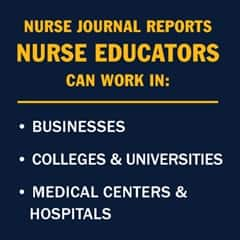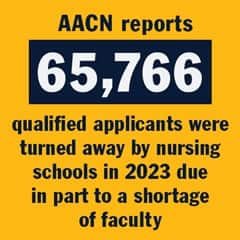Should I Be a Nurse or a Teacher? You May Be Able to do Both

Understanding the numbers
When reviewing job growth and salary information, it’s important to remember that actual numbers can vary due to many different factors—like years of experience in the role, industry of employment, geographic location, worker skill and economic conditions. Cited projections are based on Bureau of Labor Statistics data, not on SNHU graduate outcomes, and do not guarantee actual salary or job growth.
When Carol Allen, EdD, MSN, RN was in high school and preparing to apply to colleges, she often asked herself, “Should I be a nurse or a teacher?”
Allen knew she wanted to be a teacher but worried that the field was oversaturated with job seekers. So, she went against the advice of her guidance counselor and decided to prepare for a career in nursing.

After several years of working as a registered nurse (RN) and earning her master’s degree, she got the opportunity to work as a nurse educator. Preparing future nurses to earn their degrees allowed Allen to combine her passion for nursing and love of teaching.
“For me, it was like a dream come true,” said Allen, who now works as lead faculty of nursing at Southern New Hampshire University (SNHU). “I had the best of both worlds. When I became a nurse educator, I got to be the teacher I wanted to be.”
Is Nursing or Teaching a Better Career?
While the day-to-day work of nursing and teaching may seem very different, the careers have more in common than you might think.
As a teacher, you may find yourself nursing concerns beyond the lesson plans and class assignments. As a nurse, you'll be responsible for educating patients about health and wellness. In both careers, you'll need patience, empathy and strong communication skills to understand your audience and tailor your message to reach them in the way they learn best.

“Teaching really is a part of nursing,” said Dr. Stacey Rosenberg, DNP, RN, ACNS-BC, CNE, associate chief nursing administrator at SNHU. “In some ways, it’s a natural transition."
And if anyone knows this to be true, it's Rosenberg. She's worked at SNHU since 2014, and has over 20 total years of experience in the nursing and education fields. She is both a certified Adult Health Clinical Nurse Specialist and Certified Nurse Educator (CNE) with experience in curriculum development and accreditation.
According to the National Library of Medicine, in primary care, Registered Nurses (RN) have responsibilities such as: engaging with patients with chronic illnesses, using practitioner-written protocols to adjust medications and promoting population health, including creating healthier spaces for people to live and work, among other key roles.
“As nurses, we need to be able to provide patients and their families with education about health and wellness so they can manage their health care needs and make good health care choices,” said Allen.
Why is Being a Teacher Like Being a Nurse?
According to the National League for Nursing (NLN) there are several competencies that demonstrate the area in which teaching and nursing come together.
These competencies include:
- Engaging in scholarship
- Facilitating learner development and socialization
- Facilitating learning
- Functioning within the educational environment
- Participating in curriculum design and evaluation of program outcomes
- Using assessment and evaluation strategies
A career as a nurse educator can bring these worlds of teaching and nursing even closer together.
Exploring Nurse Educator Jobs
If you’re interested in pursuing a nurse educator career, you may be wondering, "What can I do with a master's in nursing with a concentration in nursing education?" Before getting started with a degree program, it's important to understand where you could work, general qualities and skills, the field's salary and career growth potential.
Roles of Nurse Educators
A nurse educator is a registered nurse who works to teach other nurses and medical professionals, according to NurseJournal.
Instead of dedicating their careers entirely to patient care, nurse educators are passionate about teaching and advocating for nurses. They offer leadership and guidance in both a professional and academic setting.
The World Health Organization (WHO) outlines some of the core proficiencies of nurse educators (WHO PDF source).
Nurse educator roles according to the WHO are:
- Communication, collaboration and partnership
- Curriculum design and implementation
- Ethical/legal principles and professionalism
- Management, leadership and advocacy
- Monitoring and evaluation
- Nursing practice
- Research and evidence
- Theories and principles of adult learning
Nurse educators also play a role in promoting quality nurse education, according to Global Health Education. An effective nurse educator is someone who is a passionate, lifelong learner who works to keep up to date with the changing techniques in technology, medicine and teaching.
Find Your Program
Qualities of a Nurse Educator
While further evaluating this career path, an additional factor to consider may be the certain skills or qualities that a nurse educator typically has. According to NurseJournal, these 5 skills are key to the foundation of being a nurse educator:
- Clinical expertise
- Communication
- Curriculum design
- Evaluation and assessment
- Leadership
Where Do Nurse Educators Work?

The term "educator" makes it sound like nurse educators only work in academic settings when they actually work in a variety of different environments.
According to NurseJournal, nurse educators work in settings such as:
- Businesses - Coaching wellness and health seminars, leading CPR and first aid programs and instructing professional development courses
- Colleges and universities - Teaching classes and running clinical educational experiences for students
- Medical centers and hospitals - Creating professional development programs for nurses, facilitating training for staff and designing educational initiatives to improve patient care.
What Pays Better, Teaching or Nursing?
According to the U.S. Bureau of Labor Statistics (BLS), RNs earned a median pay of $86,070 in 2023, while nursing instructors at the postsecondary level earned a similar median pay of $80,780.*
A nurse educator's salary can vary based on level of education, years of experience and the location of their job, and there's potential for an even greater salary.
What is the Growth Potential for Nurse Educator Careers?

The nursing field is facing a shortage of nurse educators, Rosenberg said, as current educators are retiring or nearing retirement age and demand for nursing degree programs grows.
According to a survey from the American Association of Colleges of Nursing (AACN), U.S. nursing schools turned away 65,766 qualified applicants from college degree programs in 2023, with faculty shortage listed as one of the biggest factors (AACN PDF source).
Another AACN report found that 2,166 faculty vacancies were identified at 909 nursing schools, with an additional 128 faculty positions needed to accommodate student demand (AACN Vacancies PDF source).
This demand is expected to continue. According to BLS, jobs for nurse educators are projected to grow by 18% by 2032 – significantly higher than the national average of 2.8%.*
How to Become a Nurse Educator
If you’re ready to get started with a nurse educator career, it’s important to understand the educational and professional requirements.
Most nurse educators have at least a few years of clinical nursing experience before moving into the education field and are required to be a licensed RN in order to work as an educator, said Allen. Having an advanced nursing degree is also important.
The majority of nurse educator jobs require a Master of Science in Nursing (MSN) or a doctorate degree, according to the AACN.
While not required, earning an MSN in Nursing Education could help set you apart from other applicants. A degree focused on nursing education offers registered nurses the skills and knowledge required to facilitate learning through curriculum design, teaching, evaluation and advisement.

With a strong support system, hard work and passion, Cheryl Marcotte '23MSN earned her master’s degree in nursing education through SNHU’s online credit-based program. Starting a family and furthering her education was a combined task she said she achieved proudly.
"I took some time off from school with the birth of my son. I feared that it would be hard to return... but when you have a passion for success and a strong support system, your goals are achievable," Marcotte said. "I learned that I could do more and be more."
Become a Certified Nurse Educator
Becoming a certified nurse educator through the NLN Academic Nurse Educator Certification Program (ANECP) is another way to differentiate yourself and demonstrate expertise in the field, said Rosenberg.
The NLN certification offers nurse educators the ability to establish themselves in the nurse educator practice and create a means to demonstrate their expertise in this role, according to the NLN.
Becoming certified also communicates to students, colleagues and the broader health care community that the highest standards are being met.
Should You Switch From Nursing to Teaching?
If you are already a registered nurse, considering a career change to an educator role could be valuable to your career.
According to American Nurse Journal, to determine if being a nurse educator is right for you, first assess your current education level and motivations. Additionally, be open to becoming a novice again and learning new skills in the field.
There are many experiences that can be beneficial if you're looking to transition between roles. American Nurse Journal encourages:
- Attending national nursing educator conferences
- Observing experienced educators in clinical and classroom settings
- Read up on nursing education via literature searches or a library's selection
- Take advantage of new faculty orientations and development education opportunities
- Volunteer to precept an undergraduate student
Transitioning from a working nurse to an educator may take time, but the endeavor can result in worthwhile growth and learning along the way.
Nurse Educator: The Best of Both Worlds
Whether you’re working as a registered nurse and looking to further your career or are struggling to decide between nursing and teaching, a career as a nurse educator could be a great fit.
For Allen, working as a nurse educator has allowed her to do the clinical nursing work she loves and fulfill her passion for teaching.
“I wanted to be able to impart what I knew and understood about nursing care to the next generation of nurses,” she said. "Everyone in the nation benefits when we improve patient outcomes and elevate the level of health care being provided to our populations.”
A degree can change your life. Find the SNHU online nursing program that can best help you meet your goals.
*Cited job growth projections may not reflect local and/or short-term economic or job conditions and do not guarantee actual job growth. Actual salaries and/or earning potential may be the result of a combination of factors including, but not limited to: years of experience, industry of employment, geographic location, and worker skill.
Danielle Gagnon is a freelance writer focused on higher education. She started her career working as an education reporter for a daily newspaper in New Hampshire, where she reported on local schools and education policy. Gagnon served as the communications manager for a private school in Boston, MA before later starting her freelance writing career. Today, she continues to share her passion for education as a writer for Southern New Hampshire University. Connect with her on LinkedIn.
Explore more content like this article

SNHU Joins Sigma, Global Nursing Honor Society

Academic Spotlight: Dr. Ashley Love, Program Director of Public Health Programs

What is Population Health Management?
About Southern New Hampshire University

SNHU is a nonprofit, accredited university with a mission to make high-quality education more accessible and affordable for everyone.
Founded in 1932, and online since 1995, we’ve helped countless students reach their goals with flexible, career-focused programs. Our 300-acre campus in Manchester, NH is home to over 3,000 students, and we serve over 135,000 students online. Visit our about SNHU page to learn more about our mission, accreditations, leadership team, national recognitions and awards.


